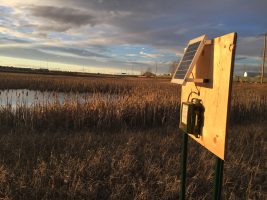Wildlife Bioacoustics: A Hands-on Introduction
- Start Date: April 10, 2024
- End Date: April 12, 2024
- Time: various, see schedule
- City: Revelstoke, BC
- Venue: School District 19, board room: 501 – 11th Street, Revelstoke, BC
- Instructor: Tyne Baker, A/Vian Ecological Consulting
- Registration now closed, contact [email protected] for late registration requests
Course description
 Automated recording technology and software has grown immensely in usability and popularity in the last decade. Many biologists are attracted to the technology to increase data capture, lower cost to capture, reduce observer effect, increase surveyor safety, and capture field data that can be revisited. First-time bioacoustical surveys can seem intimidating with high initial cost of purchase, large-scale data management, and potential for recording failure. The main goal of this course is to provide attendees with hands-on knowledge of best field practices, acoustic data management, and analysis techniques so they can confidently implement acoustic monitoring for terrestrial wildlife (e.g. birds, anurans, insects, and mammals including bats).
Automated recording technology and software has grown immensely in usability and popularity in the last decade. Many biologists are attracted to the technology to increase data capture, lower cost to capture, reduce observer effect, increase surveyor safety, and capture field data that can be revisited. First-time bioacoustical surveys can seem intimidating with high initial cost of purchase, large-scale data management, and potential for recording failure. The main goal of this course is to provide attendees with hands-on knowledge of best field practices, acoustic data management, and analysis techniques so they can confidently implement acoustic monitoring for terrestrial wildlife (e.g. birds, anurans, insects, and mammals including bats).
This is a hands-on course where participants will learn the acoustic physics and animal behaviour basics, plan surveys, prep and deploying equipment, review data for errors, build dataset management, and practice analysis techniques. Students will interact with a variety of devices and analysis software types with expert support.
A copy of the course outline is available upon request by emailing office@cmiae.org.
This course takes place over 3 days and has been scheduled to allow for travel time on the first and last day if needed:
- Day 1: 12pm – 5pm
- Day 2: 9am – 5pm
- Day 3: 9am – 12:30pm
IMAGE: Tyne Baker
Course objectives
- Provide background knowledge of acoustics physics and animal communication
- Learn how to design and plan bioacoustic surveys
- Learn field best practices to ensure safe and effective deployment of devices
- Develop good data management habits and systems
- Acquaint participants with acoustic analysis software with variety of price points and utilities
- Practice analysis with expert feedback and support
Who is this course for?
- Mid-career biologists looking to implement new technologies or expand offerings
- Project managers or industry environment leads looking to understand their technical staff or consultant’s recommendations
- Regulators trying to keep up to date on techniques they are seeing used in project proposals
- Not-for-profit organizations trying to super-charge data collection with a small teams or volunteer support
- First-nations organizations that are looking to build local capacity for consultation and conservation projects
- Students or early career scientists looking to improve their resumes
Our instructor
 Tyne Baker has been digitally eavesdropping on animals since 2009. Her Masters from the University of Windsor focused on Animal Communication and Behavioural Ecology. Through her career Tyne has developed acoustic monitoring programs for academics, NGOs and industry with projects ranging from local to international. Tyne teaches others to use remote detection tools through public, professional, and internal course offerings and program support. As the owner of A/Vian Ecological Consulting her primary goal is to make technology accessible to conservation practitioners and support well-informed environmental decisions.
Tyne Baker has been digitally eavesdropping on animals since 2009. Her Masters from the University of Windsor focused on Animal Communication and Behavioural Ecology. Through her career Tyne has developed acoustic monitoring programs for academics, NGOs and industry with projects ranging from local to international. Tyne teaches others to use remote detection tools through public, professional, and internal course offerings and program support. As the owner of A/Vian Ecological Consulting her primary goal is to make technology accessible to conservation practitioners and support well-informed environmental decisions.
See the more information about A/Vian Eco on their website, and feel welcomed to contact Tyne with any inquiries tyne.baker@avianeco.com
Preparation and what to bring
Registrants are required to bring:
- Their own laptop* with charging cable
- sd card reader
- headphones
- warm layers**
*To participate registrants will need to download free audio software tools (e.g. Audacity, Kailedescope Lite) and some provided data files to their laptops. Detailed software requirements and download instructions will be provided 1 week before the course offering.
**Though the offering is primarily indoors, participants will spend up to 2 hours outside during field deployment practice.
Some basic knowledge or experience in auditory detection of animals (eg. point counts, amphibian surveys) or dataset management is helpful but not required.
What is included with the course?
- 3 device types will be provided for hands-on use (AudioMoth, SongMeter mini, SM4FSBat) as well as other sample equipment such as song meter micro, titley scientific swift, SPL meter, multimeter, and/or focal recording equipment.
- Datasets and cluster analysis will be provided for student practice
- Registered students will receive the course slide-deck as a PDF after the course and all resources mentioned are on avianeco.com/resources.
- A certificate of completion will be provided to assist in claiming professional development credits
Registration
Registration for this course will include catered breaks and an option to add a bagged lunch for day 2. Lunches and all catering supplied by La Baguette.
*CMI memberships may be purchased upon registration – read more about CMI membership here.
CMI members $375*
Non-members $420
Registration now closed, contact office@cmiae.org for late registration requests
Where to stay?
A discounted room rate (10% off) is available to course registrants at the Grizz Hotel. This establishment is right downtown Revelstoke BC, and easy walking distance to the course location and all downtown ameneties. Rooms are available on a first come first serve basis.
To access these rates you must phone to book and request the “CMI rate.” Phone number: 250-837-5151.

